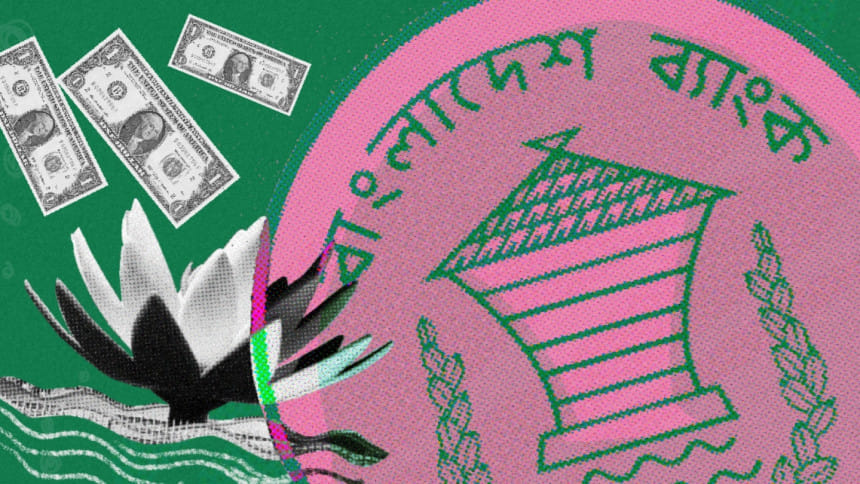Default loans hit an all-time high

Non-performing loans (NPLs) in Bangladesh's banking sector hit a new record in June as withdrawal of a relaxed central bank policy, slowdown in business sales and deliberate non-payments pushed up the volume of bad loans to Tk 1,56,039 crore, central bank data showed.
This was the highest NPL in the country's history with the previous high of Tk 134,396 crore recorded in the third quarter of last year.
In the three months to June this year, Tk 24,419 crore loans turned sour alone.
At the end of June, NPLs accounted for 10.11 percent of the total credits disbursed, according to the latest data from the Bangladesh Bank. Outstanding loans stood at Tk 15,42,655 crore.
In Bangladesh, a lack of good governance, relaxed policies pursued by the central bank, political interference and irregularities have largely been responsible for the upward trend of NPLs.
The volume started to go up after the withdrawal of a central bank relaxation on loan classification introduced amid the Covid-19 pandemic.
On the other hand, bankers say, borrowers are not interested in repaying bank loans using the ongoing economic situation as an excuse.
Moinul Islam, a former professor of economics at the University of Chattogram, thinks this is not the actual figure of bad loans because it does not include a huge volume of credits stuck in money loans court.
"If the entire amount of the loans involved in the court cases and the write-off loans are taken into consideration, the total bad loans in the banking sector will be Tk 450,000 crore."
He says the volume of bad loans will not come down unless strict actions are taken against the top defaulters.
The distressed assets in the banking industry stood at Tk 3,77,922 crore in 2022, according to BB's Financial Stability Report 2022. The distressed assets are calculated considering the total NPLs, outstanding rescheduled and write-off loans.
Syed Mahbubur Rahman, managing director of Mutual Trust Bank, says the overall economic situation is going through a difficult time now owing to external and internal factors and the growing NPLs is not a good sign for the economy.
He said that local businesses face multiple problems now as their sales have got stressed, making them unable to pay bank loans.
"Many borrowers failed to export in recent times, which have turned their loans secured against letters of credit into forced loans. Those credits have now become default loans."
An escalated level of NPLs has dire consequences for the economy as well as the financial system.
According to the Asian Development Bank, a buildup of NPLs poses a risk to banks' balance sheet health and financial soundness.
NPLs reduce interest income, lower profitability, and deplete banks' capital bases. They also require higher risk weights and minimum loss coverage in banks' capital requirements, straining liquidity and increasing funding costs. With less money available to extend new loans, banks' capacity to lend and make profits is further constrained, it said.
Recently, the International Monetary Fund said that elevated NPLs could dampen the growth prospects of Bangladesh.
"A holistic and time bound NPL resolution strategy would help address bank balance sheet weaknesses."
Anis A Khan, a former chairman of the Association of Bankers Bangladesh, a platform of chief executives of lenders, said banks provide restructured and rescheduled facilities to borrowers. As a result, bad loans have increased.
He said almost all companies are facing slower profit growth due to the ongoing US dollar crisis and skyrocketing inflation, making it harder for them to repay loans.
"Besides, there are some willful defaulters who have no intention to pay bank loans while some borrowers have a tendency to divert funds to the sectors not specified in the loan proposals."
Fahmida Khatun, executive director of the Centre for Policy Dialogue, described the NPL figure as both "surprising and shocking".
"We should have been careful and efforts were needed on the part of banks and the regulator to stem the rise of NPLs. However, it remains unchecked."
"This is even more worrying since the culture of willful loan default is taking deep roots."
She said the spiral in the default loans is alarming at this period of time as the economy is going through one of its worst periods in history in recent times.
The economist says that a rise in default loans will shrink the space for the private sector to borrow from banks as the availability of liquidity will be tight.
"It has macroeconomic implications from many aspects. Loans for the private sector will be costly and the private sector credit growth will be low which has ramifications for production, jobs and overall poverty reduction."

 For all latest news, follow The Daily Star's Google News channel.
For all latest news, follow The Daily Star's Google News channel. 








Comments